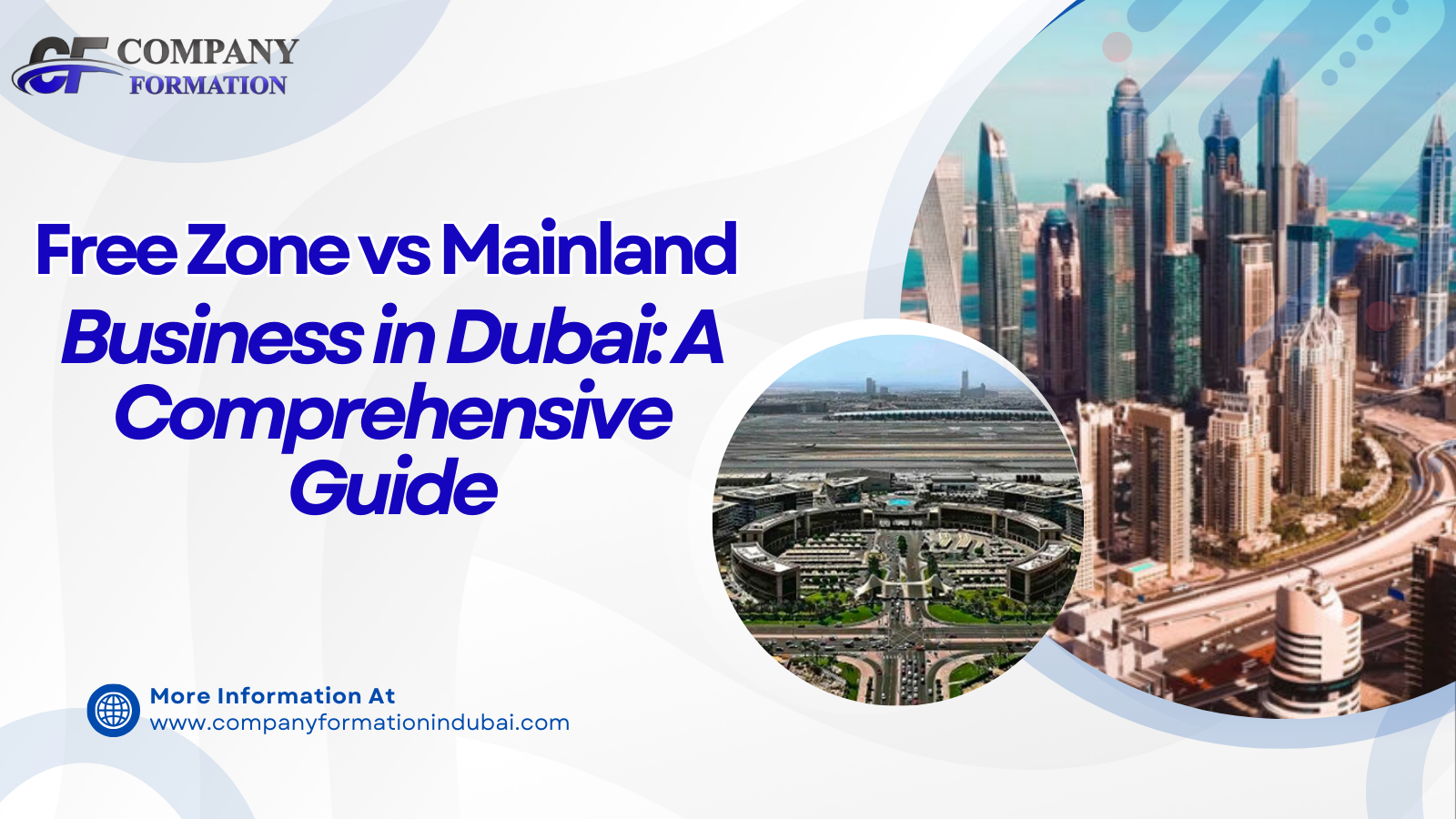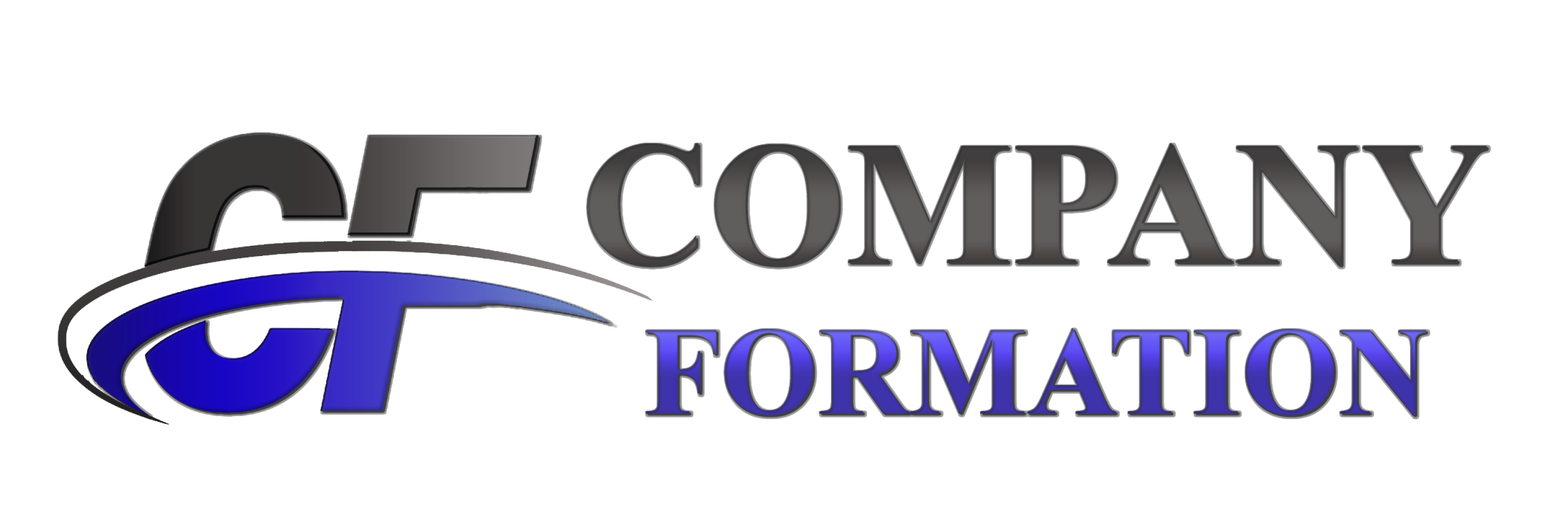Mainland vs Freezone Companies in the UAE:
- Mainland companies: Can trade within any city in the UAE and also with foreign companies.
- Freezone companies: Can trade with countries outside the UAE and with other freezones, facilitating international business.
Free Zone vs Mainland Business Setup in UAE – 2025 Complete Guide
Dubai’s rise to global prominence has sparked the interest of entrepreneurs worldwide. Whether you’re expanding an existing brand or launching a new venture, business setup in Dubai offers a unique blend of opportunity, innovation, and cultural diversity. Two major paths stand out for company formation: Free Zone and Mainland.
Choosing the right structure can influence everything from ownership and licensing to costs and market reach. This extensive guide decodes the differences, advantages, costs, and challenges of Free Zone vs Mainland setups, decision for a prosperous future in one of the world’s most dynamic business destinations.
Introduction to Dubai Business Setup
Dubai thrives on a multi-sector economy, bridging regions like the Middle East, Africa, Europe, and Asia. Over the past few decades, it has transitioned from a trade-based economy heavily reliant on oil and pearl diving to a diversified powerhouse in finance, technology, tourism, logistics, real estate, and more. This strategic transformation has been nurtured by:
- Pro-Business Legislation: The UAE government consistently updates laws to attract and retain foreign investments, such as enabling 100% foreign ownership in select Mainland business activities.
- World-Class Infrastructure: Home to some of the biggest ports (Jebel Ali), busiest airports, and advanced road networks.
- Stable Political Environment: The UAE maintains a safe, secure, and well-regulated climate, encouraging global entrepreneurs to set up regional headquarters in Dubai.
- Cultural Diversity: Hosting over 200 nationalities, Dubai fosters a cosmopolitan environment that supports innovation, networking, and global collaboration.
All these elements converge to make Dubai one of the top business-friendly locations worldwide.
Why Dubai? Key Reasons to Invest
Before choosing between Mainland or Free Zone, it’s vital to understand the larger “why” behind setting up in Dubai:
- Strategic Geographical Location
- Close to major global markets, facilitating easy import/export, especially between Europe, Asia, and Africa.
- Tax Efficiency
- Historically minimal taxes have attracted global businesses; with recent corporate tax introductions, companies still benefit from multiple exemptions, especially in free zones.
- Ease of Doing Business
- Dubai consistently ranks high on the World Bank’s Ease of Doing Business index, thanks to streamlined processes, digital applications, and supportive government authorities like the Department of Economic Development (DED) and Dubai Economy and Tourism (DET).
- Quality of Life
- Modern lifestyle, advanced healthcare, and educational institutions, making it appealing for entrepreneurs relocating with families.
- Infrastructure and Logistics
- Seamless connectivity via global airlines (Emirates) and vast cargo capabilities, plus a robust digital infrastructure.
- Flexibility in Company Setup
- Option to form Mainland, Free Zone, or Offshore companies, each with unique advantages catering to different business models.
Mainland vs Free Zone vs Offshore
In the UAE, business structures typically fall under three umbrellas:
- Mainland (Onshore)
- Registered under the Ministry of Economy and governed by the DED or DET in each emirate (e.g., Abu Dhabi, Dubai).
- Allows operations across the entire UAE market and beyond.
- Free Zone
- Established within specialized jurisdictions managed by a Free Zone Authority (FZA).
- Usually allows 100% foreign ownership and zero or minimal taxes.
- Limited direct access to the local UAE market unless a local distributor is appointed.
- Offshore
- Typically registered in jurisdictions like the Jebel Ali Free Zone Offshore or RAK International Corporate Centre (RAK ICC).
- Operates outside the UAE’s local market and focuses on international business, asset protection, and confidentiality.
While both Mainland and Free Zone structures are widely used, Offshore entities cater to more specific needs like tax planning, asset protection, or holding structures for international operations.
What is a Mainland Company in Dubai?
A Mainland company Formation is a business entity authorized to trade anywhere within the UAE and internationally. It’s often regarded as an “onshore” company because it falls under local regulations such as the Commercial Companies Law.
A. Ownership and Local Sponsor Requirements
Historically, foreign investors had to partner with a local Emirati sponsor or service agent who would hold 51% equity, while the foreign party maintained 49%. However, under UAE Federal Law No. 19 of 2018 on Foreign Direct Investment and subsequent legislation, certain business activities now allow 100% foreign ownership.
- Local Sponsor (Sponsor Share):
If your chosen business activity does not qualify for full foreign ownership, you might still need to engage a local sponsor or service agent. - Full Foreign Ownership:
Many trading, industrial, and service activities fall under this updated scheme, enabling foreigners to own 100% of their mainland enterprise.
B. Licensing and Role of the DED/DET
Licensing for Mainland companies is overseen by the Department of Economic Development (DED) in Dubai, also referred to as Dubai Economy and Tourism (DET) after brand updates. The DED/DET handles:
- Trade Name Approvals
- Initial Approvals for Business Activities
- Issue and Renewal of Trade Licenses
- Regulatory Checks (e.g., approvals from Ministry of Labor, Municipality, or specialized ministries for certain sectors like healthcare or education)
Process for Mainland Licensing typically involves:
- Choosing a Legal Structure (LLC, branch, sole establishment, etc.)
- Reserving a Trade Name
- Preparing the Memorandum of Association (MoA) or local service agent agreement
- Securing Office Space (minimum of 200 sq. ft.)
- Obtaining Approvals from relevant authorities
- Paying License Fees and final issuance
C. Business Activities and Scope
A Mainland company can engage in a wide range of commercial, professional, or industrial activities, depending on your trade license:
- Commercial License (e.g., general trading, retail, logistics)
- Professional License (e.g., consulting services, marketing, design)
- Industrial License (e.g., manufacturing, packaging)
Key Advantage: Mainland businesses are free to operate anywhere in the UAE without geographic restrictions. They can also bid for government contracts, a sector not accessible to free zone companies.
D. Office Space and Visa Quotas
- Mandatory Physical Office:
Dubai Mainland requires companies to lease a suitable office (often 200 sq. ft. minimum). - Visa Allocation:
The number of visas depends on office size and business activity. With a larger space, you may obtain unlimited visas, making Mainland ideal for those who foresee significant staff expansion.
E. Updated Laws and Regulations (2025)
- Corporate Tax (9%):
Effective from the financial year 2023–2024, Mainland companies with net profits above certain thresholds are subject to 9% corporate tax. - Flexible Ownership:
More business categories now permit full foreign ownership, reducing reliance on local sponsors. - Labor Reforms:
The UAE’s new labor laws emphasize workplace safety, equal pay, and flexibility in work contracts.
What is a Free Zone Company in Dubai?
A Free Zone company is registered within a specialized economic jurisdiction that is governed by an independent Free Zone Authority (FZA). Each free zone tailors its environment to a specific industry or activity, offering unique incentives.
A. 100% Foreign Ownership Explained
One of the biggest attractions of free zones is 100% foreign ownership, meaning you do not need an Emirati sponsor. This model allows you to:
- Retain Full Control over your business decisions.
- Access Comprehensive Tax Exemptions, often including zero corporate tax for qualifying activities, exemptions from import/export duties, and no personal income tax.
B. Free Zone Authority (FZA) and Licensing
Every free zone is regulated by its own authority—examples include:
- DMCC (Dubai Multi Commodities Centre) – Popular for trade in precious metals, diamonds, and other commodities.
- DIFC (Dubai International Financial Centre) – Known for finance, fintech, and global banking.
- Dubai Internet City (DIC) – Caters to tech firms, software developers, and digital media companies.
- JAFZA (Jebel Ali Free Zone) – One of the largest free zones globally, ideal for logistics and manufacturing near Jebel Ali Port.
- SPC Free Zone – Noted for cost-effective setups, dual licensing options, and modern infrastructure.
Each authority manages registrations, licensing, visa quotas, and compliance within its zone. Initial approvals, trade name reservations, MoA drafting, and leasing are usually processed under a “one-stop-shop” approach, significantly speeding up setup.
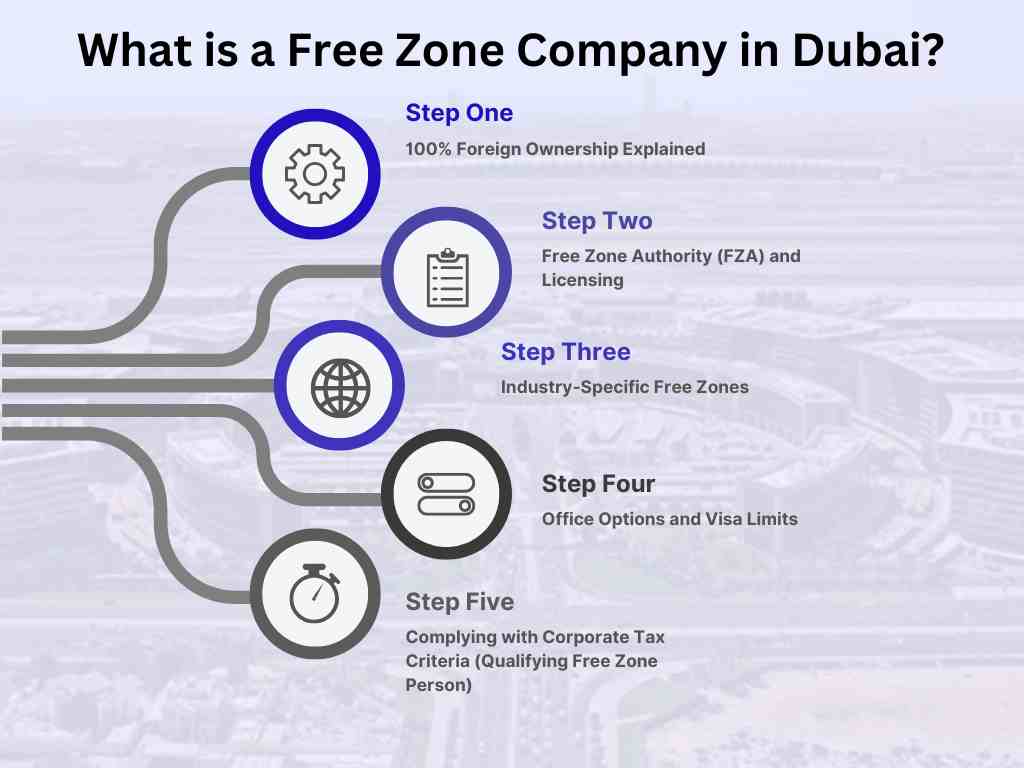
Recommended:FreeZone Companies in UAE: Benefits, Costs 2025
C. Industry-Specific Free Zones
Many free zones cater to specialized sectors:
- Media and Entertainment (Dubai Media City, Dubai Studio City)
- Healthcare (Dubai Healthcare City)
- E-Commerce and Logistics (Dubai CommerCity, EZDubai)
- Finance and Fintech (DIFC)
This clustering fosters a supportive ecosystem, offering networking opportunities, industry-focused events, and shared resource facilities for like-minded professionals.
D. Office Options and Visa Limits
Unlike Mainland, most free zones allow:
- Virtual Offices or Flexi-Desks: No need to rent large commercial spaces.
- Visa Quotas: Often limited (e.g., 1 to 6 visas) for standard packages. Additional visas may require upgrading office space.
This structure is extremely flexible for startups or small teams that don’t need extensive office footprints.
E. Complying with Corporate Tax Criteria (Qualifying Free Zone Person)
As of the recent UAE Corporate Tax introduction:
- Qualifying Free Zone Person: Free zone companies can remain at 0% corporate tax if they only derive income from outside the UAE or from other designated free zones, strictly adhering to the FTA’s conditions.
- Non-Qualifying Activities: If a free zone company sells to the Mainland or engages in unlisted activities, it risks a 9% corporate tax rate on those revenues.
- Annual Audits: Some free zones require annual external audits, especially for companies claiming the 0% corporate tax incentive.
Exploring Offshore Companies
While Mainland and Free Zone garner most of the attention, Offshore setups remain a powerful tool for certain businesses. Offshore companies are typically established under jurisdictions such as the Jebel Ali Free Zone Offshore or RAK ICC (Ras Al Khaimah International Corporate Centre).
A. Why Offshore Over Mainland or Free Zone?
- Asset Protection & Privacy:
Offshore jurisdictions often provide confidentiality and protect shareholder information from public registries. - Tax Planning:
Offshore entities can help optimize global tax strategies for multinational corporations. - International Operations Only:
Offshore companies usually cannot do business within the UAE. They’re focused on international holdings, shipping, or asset management.
B. Key Differences in Ownership and Setup
- No Physical Office Requirement: Offshore companies typically do not require a physical presence in the UAE.
- Restrictions on Local Trade: Offshore entities cannot trade in the local UAE market unless they form separate Mainland or Free Zone subsidiaries.
- Share Capital: Generally minimal, but specific amounts vary by the offshore jurisdiction’s regulations.
C. Restrictions and Drawbacks
- Local Market Exclusion: Offshore companies cannot directly trade or rent offices within the UAE.
- Banking Hurdles: Some banks require more documentation and compliance checks for offshore accounts, given global AML (Anti-Money Laundering) rules.
- Reputation: Depending on international regulations, some offshore jurisdictions may attract scrutiny from tax authorities abroad.
Bottom Line: Offshore is best suited for international holding structures, wealth management, or specialized global operations with no direct local trade in the UAE.
Mainland vs Free Zone: A Detailed Comparison
Below is a point-by-point comparison of Mainland vs Free Zone in Dubai, factoring in updated regulations and typical business concerns.
A. Ownership and Sponsorship Requirements
- Mainland:
- Historically 51% Emirati partnership required.
- Now, many activities allow 100% foreign ownership.
- Local partner or service agent may still be mandated for certain industries (e.g., oil & gas).
- Free Zone:
- 100% foreign ownership guaranteed.
- No local sponsor needed.
B. Business Scope and Market Reach
- Mainland:
- Can trade freely across the entire UAE.
- Eligible for government contracts.
- Allowed to open multiple branches without geographic constraints.
- Free Zone:
- Primarily conducts business within the designated free zone or internationally.
- Must appoint a local distributor to sell goods/services in Mainland markets.
- Industry-specific specializations can boost international trade.
C. Licensing Procedures and Approvals
- Mainland:
- Governed by DED/DET and other relevant ministries.
- Approval times vary; typically up to a month.
- Additional steps for regulated sectors (e.g., food, health, finance).
- Free Zone:
- Managed by the Free Zone Authority (FZA).
- Simplified, often “one-window” approach for licensing.
- Setup can take 1–3 weeks, depending on the free zone.
D. Office Space Requirements
- Mainland:
- Minimum 200 sq. ft. mandatory.
- Potentially more expensive rentals in prime locations, but also more visibility and foot traffic.
- Physical presence fosters local market engagement.
- Free Zone:
- Virtual offices or flexi-desks often available.
- Limited or no requirement for a physical space, depending on chosen free zone package.
- Helpful for startups looking to minimize overhead.
E. Visa Allocation Policies
- Mainland:
- Typically no cap on visas; number increases with office size.
- Ideal for companies needing numerous employees.
- Free Zone:
- Usually limited to around 1–6 visas, although you can upgrade or request more with larger office packages.
- Favored by solopreneurs or small teams.
F. Cost Structures and Capital Requirements
- Mainland:
- Setup fees often range from AED 25,999 and can rise depending on office space, local sponsorship fees, etc.
- Minimum share capital can vary (often from AED 150,000–300,000 for an LLC).
- Renewal fees, labor fees, and municipality fees apply.
- Free Zone:
- Setup costs can start as low as AED 10,000–15,000 in some free zones, but may exceed AED 50,000 depending on license type, sector, and number of visas.
- Share capital varies significantly by free zone (AED 50,000–1,000,000).
- Many free zones offer consolidated packages that bundle trade license, office desk, and visa quotas.
G. Taxation and Corporate Tax Updates (2023–2025)
- Mainland:
- Effective corporate tax of 9% on net profits above certain thresholds (typically around AED 375,000 in profit) from 2023/2024 onward.
- 5% VAT on taxable supplies.
- Full profit repatriation in most cases.
- Free Zone:
- Potential for 0% corporate tax if the entity qualifies as a “Qualifying Free Zone Person” and meets all FTA conditions (no Mainland sales, designated activities).
- 5% VAT on services/goods within the UAE.
- Possible 9% corporate tax if dealing extensively with Mainland or failing to meet free zone compliance criteria.
H. Potential for Government Contracts
- Mainland:
- Eligible to bid on UAE government tenders, unlocking significant revenue opportunities.
- Free Zone:
- Typically ineligible for direct government tenders unless partnering with a Mainland entity or obtaining special approvals.
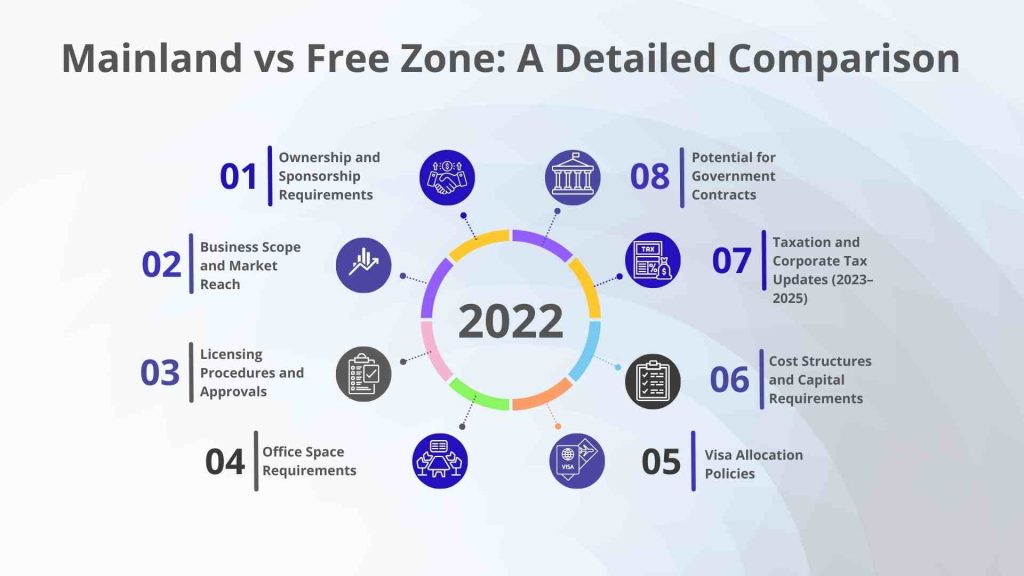
Cost Comparison: Mainland vs Free Zone vs Offshore
A. License Fees and Renewals
- Mainland:
- Initial license and registration can cost from AED 15,000 up to AED 40,000 for standard activities.
- Annual license renewal ranges widely, often around AED 10,000–15,000.
- Additional fees for local sponsor or government approvals (if applicable).
- Free Zone:
- License fees can start from AED 10,000 in smaller free zones but exceed AED 50,000 in premium free zones (e.g., DIFC, DMCC).
- Renewals are typically 10–20% cheaper than initial costs, but package structures vary.
- Offshore:
- Incorporation fees are often lower, around AED 5,000–15,000, depending on the offshore jurisdiction.
- Annual renewal is usually less than Mainland or Free Zone but doesn’t allow local trade.
B. Office or Workspace Costs
- Mainland:
- Office rents in prime areas (e.g., Downtown Dubai) can be AED 60,000+ per year for modest spaces.
- More economical locations available in areas like Al Quoz or Deira.
- Free Zone:
- Many zones offer flexi-desks at AED 8,000–20,000 annually.
- Private offices range from AED 30,000 to over AED 100,000 in top-tier free zones.
- Offshore:
- No physical office requirement; might only need a registered address with the offshore agent.
- Minimal overhead for location, best for cost efficiency if no local presence is needed.
C. Visa and Immigration Fees
- Mainland:
- Per visa cost can range from AED 4,000–7,000 including medical and Emirates ID.
- Companies pay additional labor fees, dependent on their classification tier under Ministry of Human Resources and Emiratisation.
- Free Zone:
- Visa fees vary by free zone authority, typically AED 3,000–6,000 per visa.
- Some free zones bundle visa quotas into their license packages (e.g., 2–3 visas included).
- Offshore:
- Offshore entities usually can’t sponsor UAE residence visas unless they partner with local agents or open a separate onshore branch.
D. Hidden or Ongoing Expenses
Regardless of Mainland or Free Zone, factor in:
- Annual Auditing (where applicable)
- Accounting/Bookkeeping fees
- Insurance (health insurance for employees, professional indemnity for certain activities)
- Municipality or Chamber of Commerce fees
- Renewal of Trade License
- Office utility bills (if leasing physical space)
Pro Tip: Always request a complete breakdown of all potential costs when dealing with free zone authorities, local sponsors, or setup consultants.
E. Tips for Cost Optimization
- Compare Multiple Free Zones: Each free zone has its own packages and promotions.
- Negotiate Office Leases: Check for flexible payment options or promotions.
- Bundle Services: Some business setup consultancies offer all-in-one packages for licensing, visas, and PRO services.
- Choose the Right License Category: Avoid paying for extra activities you don’t need.
Case Study: ModernGrocer LLC’s Journey
To illustrate the decision-making process, let’s consider a hypothetical yet relatable scenario:
A. Starting Point and Goals
ModernGrocer LLC, founded by Ms. Vanessa Holtz from Germany, wanted to establish a chain of premium grocery stores in Dubai. Her priorities were:
- Widespread Presence: Outlets in prominent neighborhoods to cater to local residents and tourists.
- Maximized Market Access: Ability to operate across the UAE, possibly venturing into other emirates like Abu Dhabi and Sharjah.
- Brand Visibility: Being physically near high-footfall areas for brand growth.
- Hiring Flexibility: A plan to employ at least 30 staff members in the first year, expecting expansions in subsequent years.
B. Decision Process: Mainland vs Free Zone
- Free Zone Considerations:
Ms. Holtz explored free zones for 100% ownership and tax incentives. However, strict limitations on local trade meant she would need a distributor to place her grocery products in Mainland outlets. Visa quotas in standard free zone packages were also insufficient for a large staff. - Mainland Benefits:
By choosing Mainland, Ms. Holtz gained direct access to local customers without an external distributor. She could open multiple branches near popular neighborhoods. Although she needed to lease physically larger premises to accommodate staff visas, it aligned with her brand’s expansion strategy.
C. Implementation and Outcome
ModernGrocer LLC was formed as a Mainland LLC with 100% foreign ownership (thanks to the updated legislation in her business activity segment). She secured:
- A Trade License from the DED/DET in Dubai.
- Multiple Branch Permissions to expand organically.
- Seamless Customer Reach to all local markets.
- Government Tender Opportunities for potential catering contracts with public institutions (schools, municipal offices).
The result? ModernGrocer LLC rapidly grew into a well-known chain, leveraging Dubai’s dynamic retail sector and Ms. Holtz’s robust strategy.
Sector-Specific Insights
Different industries have unique requirements when choosing between Mainland and Free Zone. Below are common sectors and how they align with each setup.
A. Technology Startups
- Free Zone: Often preferable for IT/digital ventures due to specialized clusters like Dubai Internet City, in5, or DTEC (Dubai Technology Entrepreneur Campus). These provide networking, seed funding channels, and specialized infrastructure.
- Mainland: Best for tech startups needing direct local market sales or government IT projects.
B. Healthcare Providers
- Free Zone: Dubai Healthcare City (DHCC) offers a specialized environment for medical clinics, pharma companies, and labs. However, free zone healthcare providers require partnerships or special approvals for Mainland patient outreach.
- Mainland: Direct access to UAE-based patients, plus eligibility to apply for public healthcare tenders.
C. Media and Entertainment
- Free Zone: Dubai Media City, Dubai Studio City, or TwoFour54 in Abu Dhabi are prime zones focusing on media production, broadcasting, and creative industries.
- Mainland: Essential for large-scale event management or if you aim to host events across the UAE without restrictions.
D. Financial Services
- Free Zone: Dubai International Financial Centre (DIFC) is a globally recognized finance hub with an independent legal framework based on international common law—ideal for banks, fintech, and wealth management.
- Mainland: Suitable for local financial consultancies, real estate agencies, or insurance brokers looking to serve UAE-based clients directly.
E. E-Commerce Ventures
- Free Zone: E-commerce licenses in SPC Free Zone or Dubai CommerCity streamline digital sales, offering robust logistics and warehousing solutions.
- Mainland: Necessary if your e-commerce platform wants unlimited B2C transactions throughout the UAE or aims to integrate with local marketplaces directly.
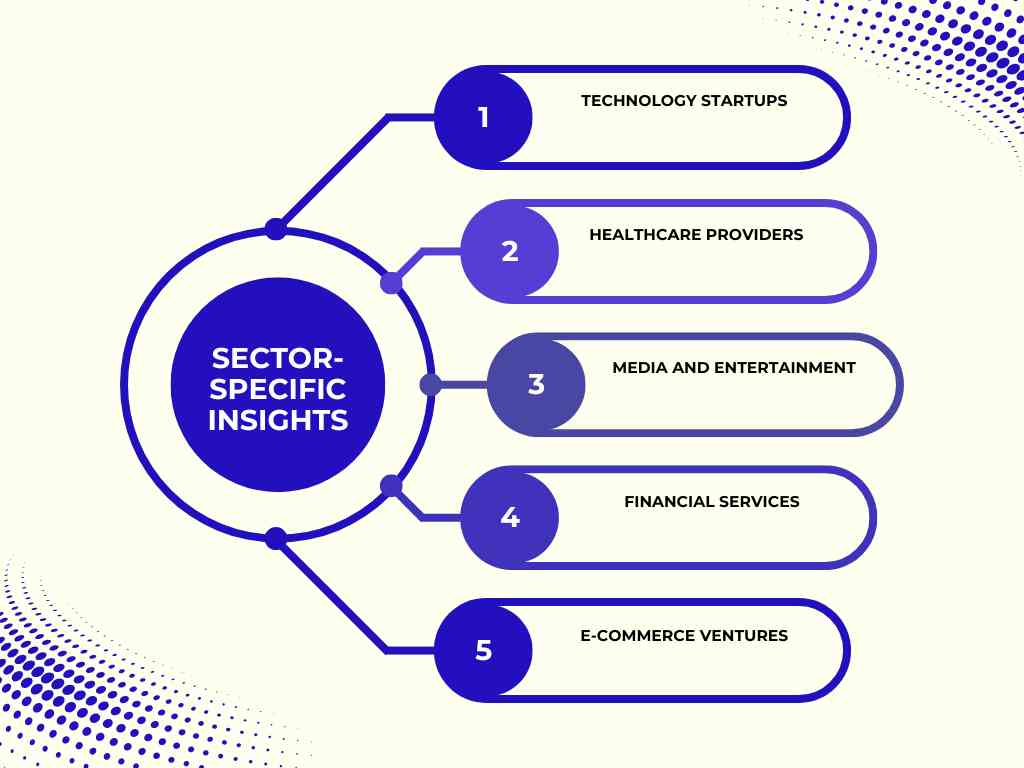
Why Consider Dual Licensing?
A dual license arrangement enables a free zone entity to operate both within its jurisdiction and on Mainland under a separate license. This hybrid approach, offered by certain free zones (e.g., SPC Free Zone), merges 100% foreign ownership benefits with unrestricted UAE market access.
A. Advantages of Operating in Both Mainland and Free Zone
- Maximized Market Reach: Sell directly to local consumers and maintain free zone trade benefits (e.g., tax exemptions on international trade).
- Diverse Operations: Conduct specialized activities in the free zone while tackling broad commercial tasks in Mainland.
- Brand Visibility: Acquire offices in strategic Mainland areas to increase brand presence and network with local clients.
- Easier Regulatory Processes: The free zone authority often streamlines the dual licensing procedure in collaboration with the DED.
B. Regulatory Steps for Dual Licensing
- Establish a Free Zone Entity: Obtain the base trade license and corporate structure in your chosen free zone.
- Apply for Mainland License: Liaise with the free zone authority and DED to secure a Mainland extension or branch.
- Comply with Sponsor Requirements (If Needed): In activities not wholly opened to foreign investment, you might need a local partner or service agent for Mainland.
- Handle Separate Renewals and Approvals: Manage annual licensing and auditing for both free zone and Mainland licenses.
Dual licensing suits businesses that want it all: specialized free zone perks and the ability to capture Mainland’s booming consumer market.
FAQs For Mainland vs Free zone
Q1: Can I convert a Free Zone company to a Mainland company later?
A: Conversion typically requires canceling your free zone license and reapplying under Mainland regulations. Some free zones facilitate streamlined processes for establishing a Mainland branch or dual license.
Q2: Is the new UAE 9% corporate tax applicable to all Mainland companies?
A: Yes, Mainland companies with profits exceeding a certain threshold (around AED 375,000) are subject to 9% corporate tax. However, small businesses under this profit cap may qualify for exemptions or 0% bracket.
Q3: How can I open a corporate bank account?
A: Most local and international banks in the UAE require your trade license, MoA, shareholder documents, and a physical office address. Mainland companies generally find it easier to open accounts, while free zone entities must adhere to free zone compliance guidelines.
Q4: Are there restrictions on renting office spaces in Mainland Dubai?
A: You must choose office spaces in areas zoned for commercial use, ensuring you meet the 200 sq. ft. requirement. Approvals from Dubai Municipality may be necessary.
Q5: Which free zone is the cheapest to set up in Dubai?
A: Smaller or emerging free zones often run competitive promotions. However, “cheapest” varies monthly due to offers. Always verify renewal fees, visa allowances, and potential expansions.
Q6: Can an Offshore company do local business in the UAE?
A: Generally no. Offshore companies are restricted to international activities unless they open a separate Mainland or Free Zone branch.
Q7: Is a local sponsor still mandatory for every Mainland activity?
A: Not anymore. Many Mainland activities permit full foreign ownership, though some strategic sectors (oil, defense, etc.) may still require local participation.
Q8: Do Mainland companies need an external audit every year?
A: Yes. Annual auditing is a standard requirement for most Mainland businesses to ensure financial transparency and compliance.
Conclusion
From unrestricted UAE market access to global trade facilitation, both Mainland and Free Zone pathways in Dubai come with distinct perks. Your ultimate decision depends on factors such as:
- Market Focus: Are you targeting local UAE consumers or primarily international clients?
- Ownership Preferences: Do you want to retain 100% foreign ownership, or are you in a sector that allows it on Mainland as well?
- Budget & Cost Structure: Evaluate licensing fees, office rentals, visa costs, and hidden expenses to see which structure aligns with your finances.
- Growth Projections: If you foresee high staffing needs, Mainland might be more flexible for unlimited visas. If you want specialized hubs, a free zone with relevant industry clustering might be ideal.
- Regulatory Environment: Check if your business activity is fully permitted for Mainland 100% ownership or if certain free zones cater specifically to your niche.
If you need both strong local presence and the tax advantages or specialized infrastructure of a free zone, consider dual licensing in dubai. Meanwhile, Offshore solutions cater to international asset management and holding structures, albeit with restrictions in local operations.
Ultimately, Dubai is well-positioned to accommodate virtually any business model. By leveraging the city’s pro-innovation climate, new 2025 regulations, and robust infrastructure, entrepreneurs can build a strong foundation and thrive in the competitive global landscape.

